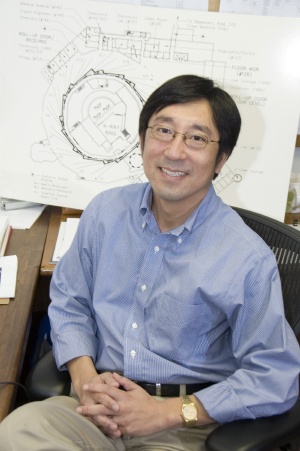Dec 9 2008
Chi-Chang Kao, a physicist and leader in synchrotron light research, has been named founding Director of the Joint Photon Sciences Institute (JPSI) at the U.S. Department of Energy's Brookhaven National Laboratory, effective immediately.
 Chi-Chang Kao
Chi-Chang Kao
JPSI is an interdisciplinary research institute meant to exploit the properties of advanced light sources to address challenging problems in science and technology, including the development of renewable, alternative energy sources and new drugs and medical treatments. It will especially benefit from the unprecedented capabilities of the National Synchrotron Light Source II (NSLS-II), a proposed scientific user facility that would produce x-rays more than 10,000 times brighter than Brookhaven Lab’s current light source, the NSLS.
A partnership between the U.S. Department of Energy and New York State, JPSI will be located just steps away from NSLS-II and its high-tech neighbor, the Center for Functional Nanomaterials. The building will contain specialized state-of-the-art laboratories for turning novel ideas into scientific instruments. The institute will support interdisciplinary teams of visiting and resident researchers working on various themes in photon sciences, including, energy, microelectronics, and health, life, and environmental sciences.
In his new role, Kao will be responsible for developing the scientific programs within JPSI as well as for overseeing the construction of the building. He also will continue to serve as Chair of the NSLS, a job he has performed for the last three years.
“JPSI will create an environment where collaborative teams of university faculties and their graduate students, staff from Brookhaven and other national labs, and research and development specialists from industry will interact to solve some of the nation’s most critical scientific and technical problems,” Kao said. “I’m excited to help create this innovative center and nuture the groundbreaking ideas and the bright new generation of scientists and engineers that will grow from it.”
JPSI will also be a center within Stony Brook University, integrating graduate and undergraduate educational programs and providing a focal point for faculty research both within Stony Brook and outside by coupling to other New York State institutions. The institute will be overseen by a Governing Board, co-chaired by Doon Gibbs, Brookhaven’s Deputy Director for Science & Technology, and Eric Kaler, Stony Brook’s Provost.
“In addition to being a great scientist, Chi-Chang is also a great leader, able to stimulate new ideas and connect people who have never worked together before,” Gibbs said. “He is an excellent choice to lead the development of this unique and important center.”
Kao earned a bachelor’s degree in chemical engineering in 1980 from National Taiwan University and a Ph.D in chemical engineering from Cornell University in 1988. Shortly after, he joined BNL as a postdoctoral research assistant at the NSLS. His research focuses on the development of new experimental techniques using synchrotron radiation, and their applications to condensed matter physics and material sciences.
In 1997, Kao received tenure as a Brookhaven physicist, and he was promoted to senior physicist in 2001. He was named NSLS Deputy Chairman in 2005, and appointed as Chairman of the NSLS Department in 2006. Kao is also an adjunct professor in the Department of Physics and Astronomy at Stony Brook University and a fellow of the American Physical Society.